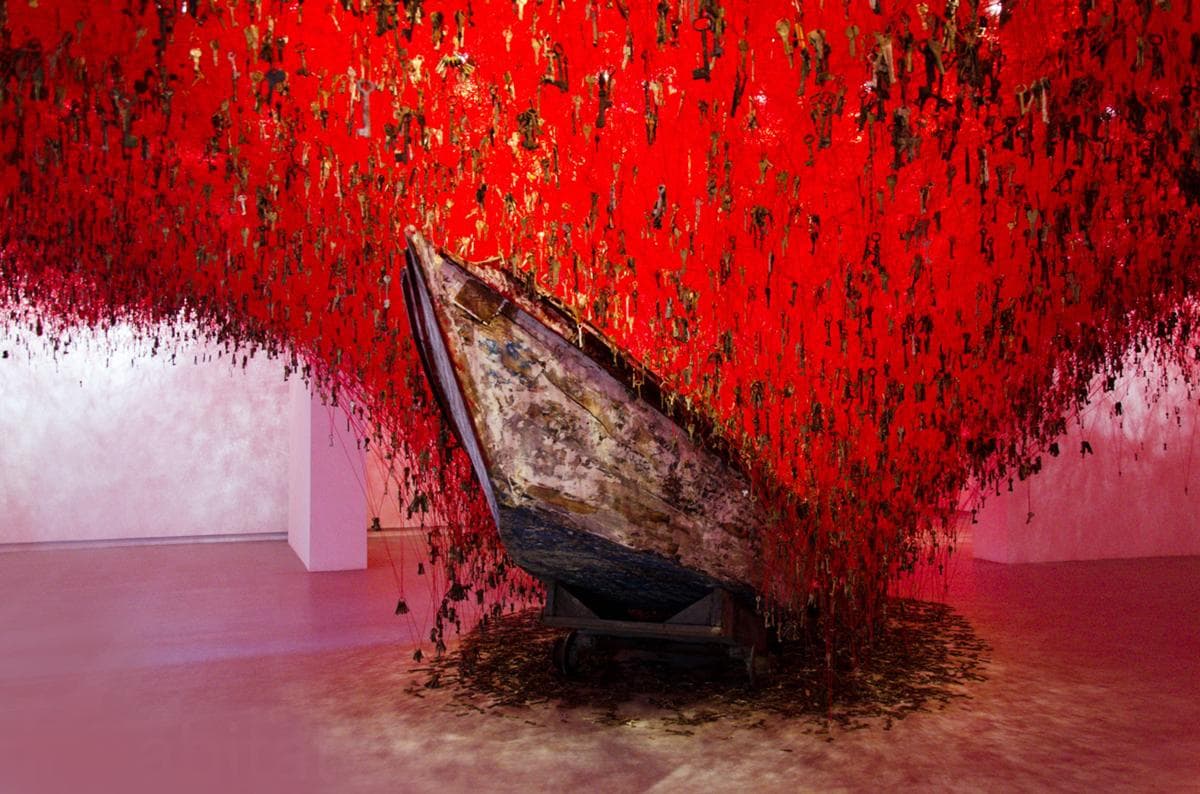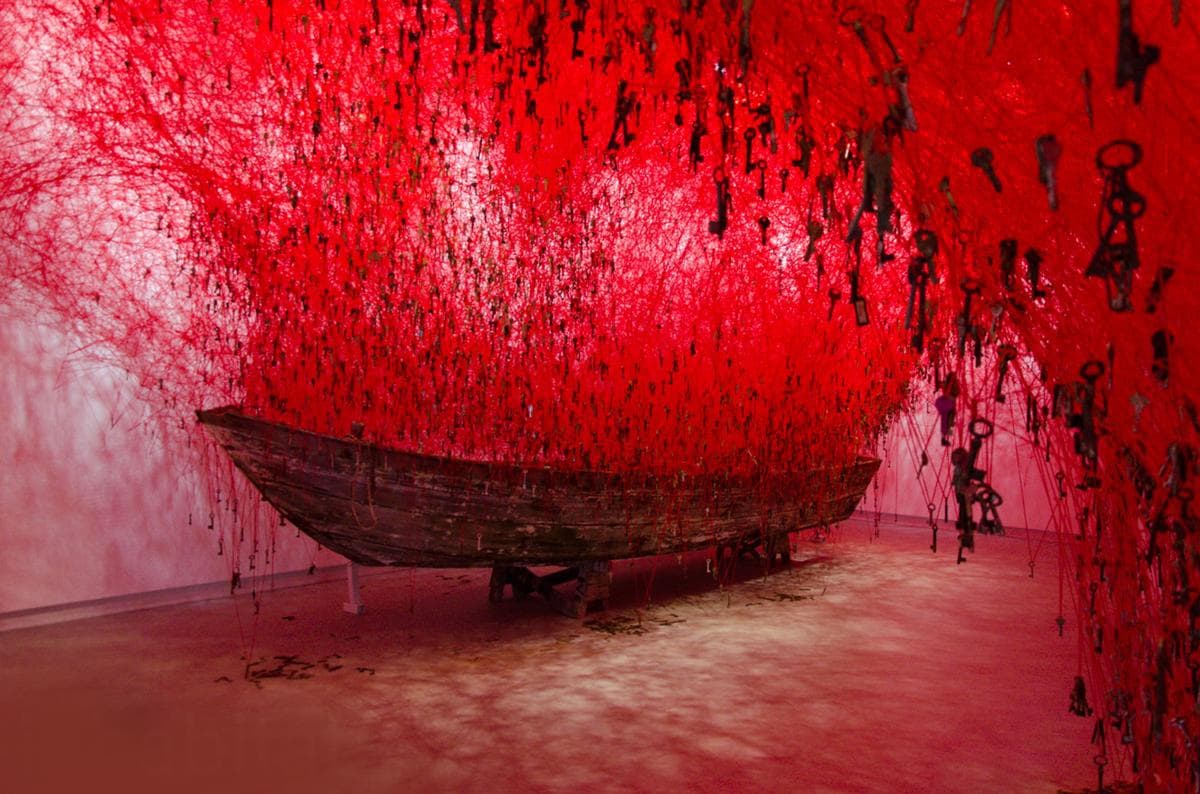March 25: Extraordinary Suffering and Immense Joy
♫ Music:
Day 25 - Saturday, March 25
The Blood of the Lamb
Scripture: Revelation 7:11-17
And all the angels were standing around the throne and around the elders and the four living creatures, and they fell on their faces before the throne and worshiped God, saying, “Amen! Blessing and glory and wisdom and thanksgiving and honor and power and might be to our God forever and ever! Amen.” Then one of the elders addressed me, saying, “Who are these, clothed in white robes, and from where have they come?” I said to him, “Sir, you know.” And he said to me, “These are the ones coming out of the great tribulation. They have washed their robes and made them white in the blood of the Lamb. “Therefore they are before the throne of God, and serve him day and night in his temple; and he who sits on the throne will shelter them with his presence.They shall hunger no more, neither thirst anymore; the sun shall not strike them, nor any scorching heat. For the Lamb in the midst of the throne will be their shepherd, and he will guide them to springs of living water, and God will wipe away every tear from their eyes.”
Poetry:
"When He Shall Come"
By Almeda J. Pearce
When He shall come, resplendent in His glory,
To take His own from out this vale of night,
O may I know the joy at His appearing--
Only at morn to walk with Him in white!
When I shall stand within the court of Heaven
Where white-robed pilgrims pass before my sight--
Earth’s martyred saints and blood-washed overcomers--
These then are they who walk with Him in white!
When He shall call, from earth’s remotest corners,
All who have stood triumphant in His might,
O to be worthy then to stand beside them,
And in that morn to walk with Him in white!
EXTRAORDINARY SUFFERING AND IMMENSE JOY
This is the culmination of a week spent meditating on Christ’s sacrifice. Today’s passage from Revelation comes at the conclusion of the entire Bible, giving us the privilege of seeing the throne of God and the post-resurrection Lamb.
Our understanding of the book of Revelation can so easily be tainted by the whims of our generation. Speculative end times fiction, sensationalistic theology, or an obsessive focus on the “who, where, when, why, how” questions can overshadow the wonders contained within Revelation. That is a great shame.
In Revelation 7:9-10, the Apostle John surveys “a great multitude that no one could number” who “cry out with a loud voice ‘Salvation belongs to our God, who sits on the throne, and to the Lamb!’” These multitudes, “the ones coming out of the great tribulation,” have made their robes white in the blood of the Lamb. Revelation 7 presents the reaction of these multitudes: loud proclamation and effusive worship.
This passage contrasts the experience of extraordinary suffering and the immense joy of worship. Despite their hardships, their only reaction (when presented with God and the Lamb whose blood was shed) is to burst forth with worship. This might seem foreign to us. In our lives, we may be going through, or have been, or will go through, our own tribulations and trials. A state of lament can be more familiar to us than a state of joyous worship.
Our video and music today bring together the two disparate aspects: the lament of tribulation and the joy of praise. Anna Akhmatova’s Requiem is a somber and reflective piece, echoing the lament and suffering that permeates life in tribulation. George Frideric Handel’s “Worthy is the Lamb” from his lauded Messiah bursts forth like a kaleidoscope of joy. Chiharu Shiota’s vivid piece The Key in the Hand is similarly evocative, suggesting a safe harbor or relief among difficulty.
I find it indescribably wonderful that lament and praise can be brought directly to the throne of God. Hebrews 8:1b-2a relates that “we have such a high priest, one who is seated at the right hand of the throne of the Majesty in heaven, a minister in the holy places.” This “high priest, holy, innocent, unstained, separated from sinners” is Jesus Christ, the Lamb. (Hebrews 7:26) Today’s passage ends with a meditation on the Lamb as Shepherd. While we frequently refer to John 10 when talking about Jesus as the Shepherd, the complexities present in Revelation 7 deepen our appreciation and worship.
Pair together John 10:14-18, Romans 8:26-27, Hebrews 7:24-27, and Revelation 7:15-17: We are known by Jesus, the great high priest of a better covenant who intercedes for us. He is the Lamb and the Shepherd. He lays down his life for us, his sheep, so that we may be made clean by his blood. Our laments and worship, enabled by the intercession of the Spirit and the sacrifice of Jesus’ blood, can go directly before the throne of God. Hallelujah!
As the book of Revelation reveals, we will one day be physically present before the throne of God and before the Lamb. Here all lament ends and worship eternal begins. What a sweetness that will be.
PRAYER
Praise and glory and wisdom and thanks and honor and power and strength be to our God for ever and ever.
Amen!
Stacie Schmidt
Reference and Instruction Librarian
Library Liaison for Education, History, and Political Science
About Anna Akhmatova’s Requiem Video:
Internationally known art house, Cryptic under the direction of Cathie Boyd in collaboration with the Latvian Radio Choir staged this work in 2001 at the Latvian National Opera in co-production with Tramway, Glasgow titled Black Over Red. The composer Anthea Haddow used recordings of Russian poet, Anna Akhmatova actually reciting her masterpiece “Requiem.” 24 members of the radio choir memorised the score and moved around the stage while singing.
Between 1935 and 1940 Anna Akhmatova (1889-1966) composed, worked and reworked the long poem “Requiem” in secret. It is a lyrical cycle of lamentation and witness, depicting the suffering and martyrdom of the common people under Soviet terror. It consists of ten numbered poems that examine a series of emotional states, exploring suffering, despair, and devotion, rather than a clear narrative. Biblical themes such as Christ's crucifixion and the devastation of Mary, Mother of Jesus and Mary Magdalene, reflect the ravaging of Russia, particularly witnessing the harrowing of women in the 1930s. In “Requiem,” Akhmatova took on the public role as chronicler of the terror. In large part, her work is a tribute to those who were imprisoned and lost their lives as Christian martyrs.
The following is a brief excerpt from the epilog of “Requiem.”
I have learned how faces fall,
How terror can escape from lowered eyes,
How suffering can etch cruel pages
Of cuneiform-like marks upon the cheeks.
I know how dark or ash-blond strands of hair
Can suddenly turn white. I've learned to recognize
The fading smiles upon submissive lips,
The trembling fear inside a hollow laugh.
That's why I pray not for myself
But all of you who stood there with me
Through fiercest cold and scorching July heat
Under a towering, completely blind red wall.
About the Artwork:
The Key in the Hand (3 views)
Chiharu Shiota
Installation with red wool, keys and 2 boats (2015)
Japan Pavilion, 56th Venice Biennale, Venice, Italy
About the Artist:
Chiharu Shiota (b.1972) is a Japanese installation artist who has has been living and working in Berlin since 1996. Shiota's oeuvre links her art performances and installation practices. Mostly renown for her vast, room-spanning webs of threads or hoses, she links abstract networks with concrete everyday objects such as keys, windows, dresses, shoes, boats and suitcases. Besides installation works, she frequently collaborates with choreographers and composers in opera, concert and dance projects. The Key in the Hand, is an elaborate entanglement of red wool and keys that hang above two ancient looking boats. This installation was Japan’s entry in the 2015 Venice Art Biennale. Over 50,000 keys were used. The keys were collected from individuals around the world. Shiota says, “Keys are very valuable things that protect important people and spaces in our lives. They also inspire us to open the door to unknown worlds.”
About the Music:
“Worthy is the Lamb That was Slain”
Lyrics:
Worthy is the Lamb that was slain,
and hath redeemed us to God by his blood,
to receive power, and riches, and wisdom,
and strength, and honour, and glory, and blessing.
Blessing and honour, glory and power,
be unto Him that sitteth upon the throne,
and unto the Lamb, for ever and ever.
Amen.
About the Composer:
George Frideric Handel (1685 – 1759) was a German Baroque composer who spent the bulk of his career in London, becoming well known for his operas, oratorios, anthems, and organ concertos. He was strongly influenced by the great composers of the Italian Baroque and the middle-German polyphonic choral tradition. Musicologist Winton Dean writes that his operas show that "Handel was not only a great composer; he was a dramatic genius of the first order.” Handel composed more than forty operas in around thirty years. Handel’s Messiah was first performed in Dublin on April 13, 1742, and received its London premiere nearly a year later. After an initially modest public reception, the oratorio gained in popularity, eventually becoming one of the best-known and most frequently performed choral works in western music. Handel's Messiah has been described by the early-music scholar Richard Luckett as "a commentary on Jesus Christ's Nativity, Passion, Resurrection and Ascension," beginning with God's promises as spoken by the prophets and ending with Christ's glorification in heaven. The music for the Messiah was completed in 24 days of swift composition. At the end of the manuscript Handel wrote the letters SDG -- Soli Deo Gloria, “To God alone the glory.”
About the Performers:
The London Philharmonic Choir was founded in 1947 as the chorus for the London Philharmonic Orchestra. The Choir has always met with critical acclaim. Now widely regarded as one of the nation’s finest choirs, they perform regularly with the London Philharmonic Orchestra and other world-class orchestras at major venues and festivals throughout the year.
https://lpc.org.uk/
The London Philharmonic Orchestra is one of the world's finest symphony orchestras, balancing a long and distinguished history with a reputation as one of the UK's most adventurous and forward-looking orchestras. The Orchestra was founded by Sir Thomas Beecham in 1932, and since then has been headed by many of the great names in the conducting world. The Orchestra's current Principal Conductor is Vladimir Jurowski, who was appointed in 2007. The London Philharmonic Orchestra has been performing at Southbank Centre's Royal Festival Hall in London since it opened in 1951. Having long been embraced by the recording, broadcast and film industries, the London Philharmonic Orchestra broadcasts regularly on TV and radio. They also work with the Hollywood and UK film industries, and have been recording soundtracks for over half a century.
https://www.lpo.org.uk/
About the Poet:
Almeda J. Pearce (1893-1966) wrote the poem, “When He Shall Come,” which was published as a hymn in 1934. Pearce’s husband Rowan, was a Bible teacher who often spoke on prophetic subjects. But it was personal experience that particularly drew Mrs. Pearce to the theme of this poem. She suffered from hemophilia, a condition in which the blood has an insufficient clotting factor, resulting in excessive and dangerous bleeding. In her discouragement Almeda felt the nearness of death, but the Lord gave her a sense of His presence, and peace returned. It was her renewed vision of the eternal kingdom, in contrast to “this veil of night” in which we live, that inspired her. Eventually, a blood donor was found that could help her, and she lived to the age of seventy-three.
About the Devotion Writer:
Stacie Schmidt has a B.A. in History from Cedarville University and a M.L.I.S. from UCLA. At the Biola Library, Stacie guides students in their research through instruction and in-depth consultations. Outside of the Library, she loves to read Dorothy L. Sayers’ mystery novels, write about film, and count the days until the next Star Wars movie.


